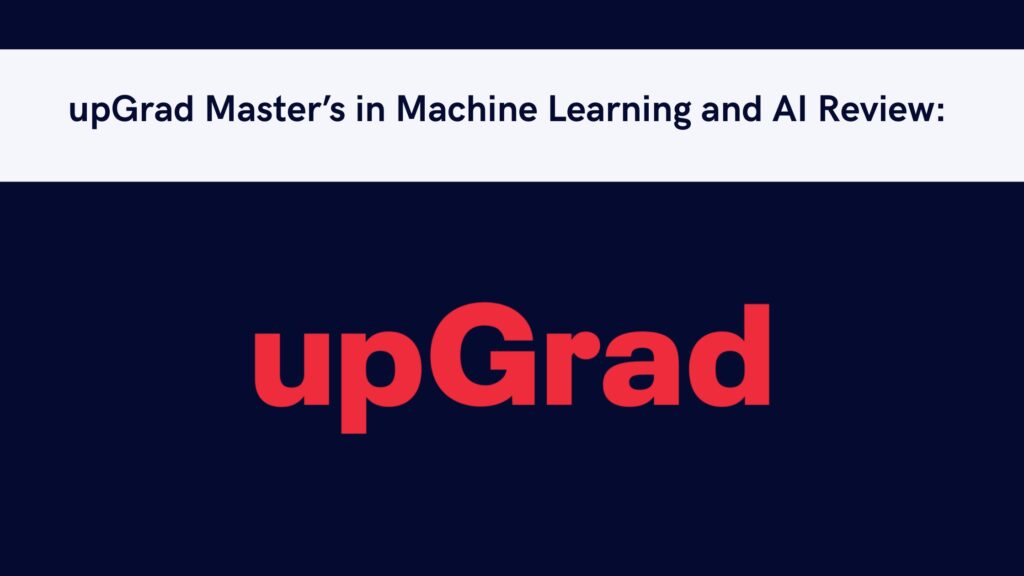Are you searching for an upGrad Master’s in Machine Learning and AI review that actually tells you what the program is like — beyond the marketing lines?
Here’s my honest take after going through the course structure, student feedback, and updates made in recent batches. If you’re planning to enroll in sometime in 2026, this review gives you a clear picture of how the upGrad Master’s with IIIT Bangalore and Liverpool John Moores University (LJMU) performs today.
We’ll go over the syllabus, Generative AI modules, learning experience, faculty support, and real career outcomes to help you see if it truly fits your goals in AI and machine learning.
By the end, you’ll know what’s good, what could be better, and if this program is worth it for your next career move in 2026.
upGrad Master’s in Machine Learning and AI Review
Quick Verdict
| Parameter | Details |
|---|---|
| Program Name | upGrad Master’s in Machine Learning and Artificial Intelligence |
| Duration | 18–21 months |
| Offered By | upGrad in collaboration with IIIT Bangalore and Liverpool John Moores University (UK) |
| Degree Awarded By | Liverpool John Moores University (UK) |
| Accreditation | Dual alumni status from IIIT Bangalore and LJMU |
| Specialisations | Machine Learning, MLOps, Generative AI |
| Career Support | 1:1 career mentorship, mock interviews, resume review, exclusive job portal access |
| Best Suited For | Working professionals planning to transition into ML, AI, or Generative AI roles |
| MLTut Overall Rating | ⭐ 4.7 / 5 |
Introduction
AI isn’t slowing down. Every few months, there’s a new model, a new tool, and a new skill in demand. If you’ve been learning on your own, you’ve probably realized surface-level knowledge doesn’t cut it anymore. You need depth. You need structure. And you need guidance from people who’ve actually worked in this space.
That’s where programs like the upGrad Master’s in Machine Learning and AI come in. Designed with IIIT Bangalore and Liverpool John Moores University (UK), this master’s tries to bridge the gap between academic learning and real-world AI practice. It mixes theory with practical projects, covering areas like Generative AI, MLOps, and advanced Machine Learning that are shaping how AI is applied in 2026 and beyond.
If you want to explore how the program looks from the inside, check out upGrad’s official course page — it gives a detailed breakdown of modules and tools. [Explore the Program →]
In this upGrad Master’s in Machine Learning and AI Review, I’ve broken down the program from a learner’s point of view. I’ve looked into the syllabus, learning flow, mentor support, and career outcomes, not just what’s written on brochures but how it actually plays out.
If you’re thinking about investing your time and energy into this program, this review will help you see what’s strong, what’s missing, and whether it aligns with the AI career path you’re aiming for.
Program Overview
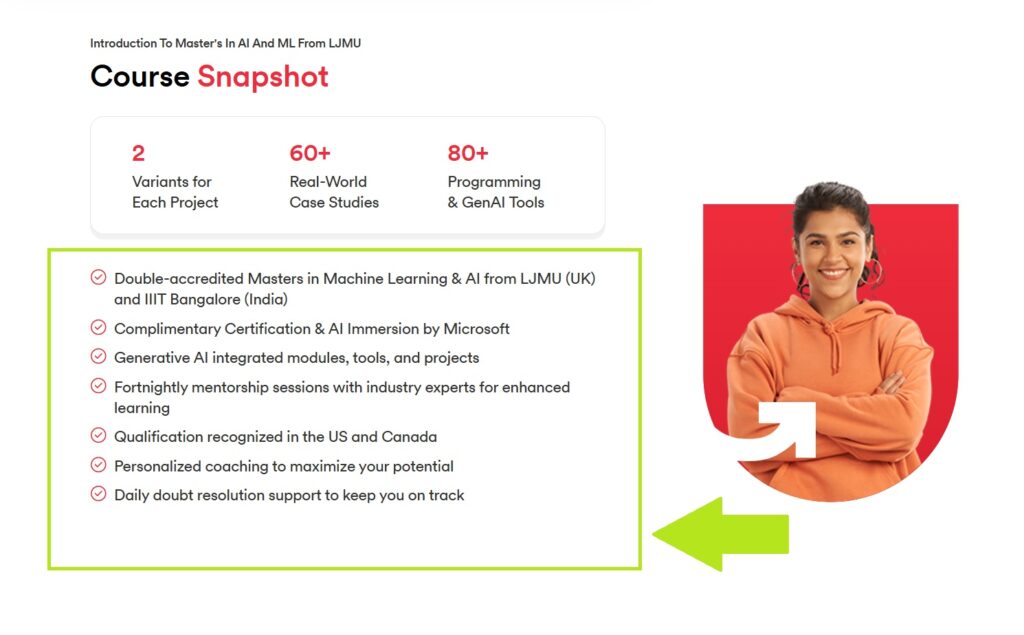
The upGrad Master’s in Machine Learning and AI runs for about 18 to 21 months and ends with a Master’s degree from Liverpool John Moores University (UK). The journey starts with IIIT Bangalore, where you build a strong base in data science, machine learning, and applied AI. Once that part is complete, you move on to the LJMU segment, which includes a detailed research thesis that adds solid academic weight to your learning.
In recent updates, the program has added Generative AI as a key focus. You’ll learn how today’s systems use Large Language Models (LLMs), transformers, retrieval-augmented generation (RAG), and prompt engineering — skills that define modern AI work.
By the end, you earn two credentials: an Executive Diploma from IIIT Bangalore and a Master of Science degree from LJMU. You also become part of both alumni networks, connecting you with professionals and academics across India and the UK.
You can view the full syllabus and degree details directly on upGrad’s official website. [See Complete Curriculum →]
Universities Behind the Program
The IIIT Bangalore team brings deep academic and industry experience to the table. Known for its focus on computing and applied AI, the institute has faculty members with over 15 years of experience. They combine strong research backgrounds with real-world problem-solving, giving you both theory and practical direction throughout the program.
Liverpool John Moores University (LJMU) adds the global edge. It’s one of the top young universities in the UK, with a solid reputation in computer science and artificial intelligence. Many of its professors are actively involved in applied AI research, which gives the program its international credibility.
upGrad acts as the bridge that connects everything. It manages the online platform, live classes, and mentorship. More than just a course provider, upGrad focuses on turning academic learning into job-ready skills through projects, case studies, and guided career support.
The faculty lineup and university collaboration details are available on upGrad’s program page. [Meet the Faculty →]
Curriculum Breakdown
What I really liked about this program is how it builds your skills in layers. It doesn’t rush you into neural networks or big models right from day one. Instead, it starts small, fixes the basics, and then moves into deeper AI topics like Generative AI and MLOps. That structure makes it easier to stay consistent and not feel lost — something I’ve seen many learners struggle with in other programs.
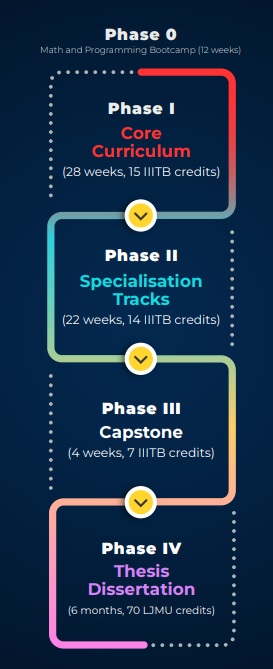
Phase 0: Math and Programming Bootcamp
The first 12 weeks focus on Applied Math and Programming. If you’re from a non-CS background, this phase is a blessing. You go through probability, statistics, linear algebra, calculus, Python, and SQL — all the core building blocks.
I found this phase valuable because upGrad doesn’t assume you’re already good at coding or math. The pace feels manageable, and it genuinely helps everyone start from the same point. In many online AI courses, this early gap often becomes the biggest reason people drop off.
Phase I: Core Curriculum
Once you’re past the boot camp, the real journey starts. The core curriculum introduces the major technical skills every ML or data science role expects you to know.
It covers:
- Advanced Mathematics for Data Science – linear algebra, calculus, and probability distributions
- Programming for Data Workflows – Python, SQL, NoSQL, OOP
- Data Analysis & Visualization – Python, Power BI, Tableau
- Cloud & Big Data Fundamentals – AWS, Azure, GCP, PySpark
- Machine Learning Foundations – regression, decision trees, ensembles, clustering
- Deep Learning & NLP – CNNs, RNNs, and text understanding
Every module has a project. You’ll work on things like analyzing Spotify data, predicting NYC taxi demand, or building a stock price prediction model.
What stood out to me is that the projects don’t feel like “mini assignments” just for grading. They’re realistic, messy, and closer to how real data behaves. You actually get a sense of how to move from idea to implementation — a gap many MOOCs still fail to close.
Phase II: Specialization Tracks
After the core modules, you pick a path that matches your career goals. There are two tracks: MLOps and Generative AI. Each one takes the foundation you built earlier and turns it into something you can use professionally.
MLOps Specialisation
If you enjoy the systems side of AI — deployment, pipelines, and automation — this is the more practical choice.
You’ll explore:
- Advanced ML (SVMs, Explainable AI, Time Series, Recommendation Systems)
- Data Pipelines and Automation
- AWS, Azure, GCP Workflows
- Real-Time Analytics with Kafka, Flink, and Spark Streaming
- Model Monitoring and Scheduling
The MLOps track stood out for me because it mirrors how real ML teams operate. You don’t just build models; you learn how to maintain them. That’s a skill that instantly makes you more valuable in an AI team.
The projects, like fraud detection and automated retraining pipelines, are practical and reflect the kind of problems companies actually face.
Generative AI Specialization
This is where the program feels future-focused. You dive into LLMs, transformers, RAG, and prompt engineering — the backbone of modern AI applications.
Key topics include:
- LLM Frameworks (LangChain, LLaMA Index)
- Retrieval-Augmented Generation (RAG)
- Prompt Engineering and Multimodal Models
- Information Retrieval and Embeddings
- Advanced CNNs, LSTMs, Transformers
- AI Ethics, Data Governance, and Model Security
The projects are creative and current — building LLM-based feedback systems, RAG-powered summarizers, and sentiment analysis tools. I found this track to be a great fit for learners who want to stay ahead of the curve and actually work with the tech that’s shaping 2026 and beyond.
Phase III: Capstone Project
This phase is your test ground. You choose an end-to-end AI project — either from the provided list or based on your own data and domain.
I liked the flexibility here. You can align your project with your industry or even extend something you’re already working on. Each step gets mentor feedback, so you don’t get stuck midway.
By the end, you’ll have a portfolio project that feels like real work, not a simulation. I’ve seen people use their capstones as talking points in interviews — and it works.
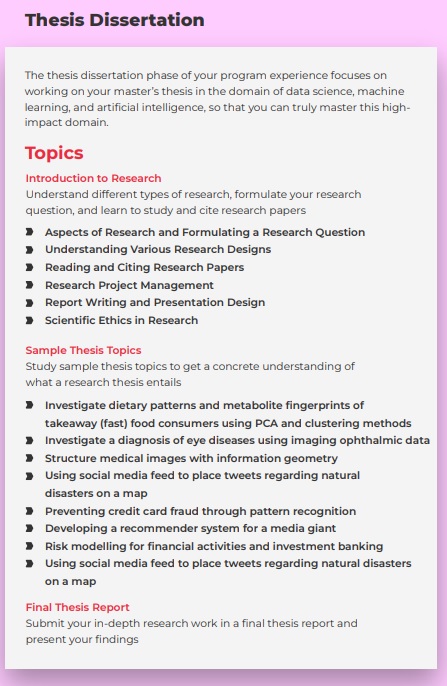
Phase IV: Thesis Dissertation (LJMU)
The final part is a six-month research thesis guided by LJMU faculty. This is what gives the program its academic credibility.
You get to work on topics such as:
- Detecting peripheral neuropathy using Random Forest
- Traffic junction classification using CNNs
- Financial risk modeling
- Eye disease diagnosis using medical imaging
It’s structured like real research — problem definition, experimentation, and documentation. If you plan to move into research-heavy roles or even a PhD later, this section gives you a solid head start.
My Take
What I personally appreciate is the balance. The program doesn’t feel rushed, and it doesn’t try to sell buzzwords. It builds your confidence phase by phase.
The Generative AI track makes it current. The MLOps track makes it industry-ready. And the LJMU thesis adds depth that’s missing from most online master’s programs.
This structure gives the program long-term value for those entering the field in 2026, when AI jobs will demand both technical and applied skills.
I was impressed by how much the curriculum has evolved since the first version. You can explore the latest updates, projects, and GenAI modules here. [View Updated Curriculum →]
Generative AI Integration in 2026
Generative AI has changed how we think about machine learning. It’s no longer just about prediction, it’s about creation, reasoning, and automation. I was glad to see that the upGrad Master’s in Machine Learning and AI didn’t ignore this shift. The curriculum now weaves Generative AI into multiple stages of learning instead of treating it like an optional topic at the end.
You don’t just read about it. You actually build things. The program covers the full cycle of modern AI systems, prompt engineering, fine-tuning models, using embeddings, deploying RAG systems, and even exploring the ethics behind AI outputs.
What stood out to me is the use of LangChain and other current frameworks that professionals actually use to connect models with real-world data. You also get to design agentic systems that mimic human decision-making, something very few online programs teach with this level of hands-on focus.
In my view, this is what makes the degree feel future-ready. It keeps pace with where AI is going, not just where it’s been. Most online master’s programs still teach machine learning as if Generative AI doesn’t exist yet. This one doesn’t make that mistake.
You can see how upGrad integrates Generative AI modules in their latest batch here. [See GenAI Module Details →]
Faculty Review
One thing that often defines how much you actually learn in an online program is the quality of the teaching team. The upGrad Master’s in Machine Learning and AI does well here by combining academic expertise with real-world experience.
The IIIT Bangalore faculty includes some of the most respected names in computing and AI. Professors like Dr. Debabrata Das, Prof. Dinesh Jayagopi, and Prof. G. Srinivasaraghavan bring a strong mix of research depth and teaching clarity. They explain complex topics in a way that feels approachable, even when you’re learning online.
From Liverpool John Moores University (LJMU), professors such as Prof. Dhiya Al-Jumeily and Dr. Manoj Jayabalan add an international and research-driven edge. Their sessions often give a broader, global perspective on how AI systems are studied and applied across industries.
Alongside them, you have industry mentors from companies like Hotstar, NatWest, American Express, and Zalando. These sessions are usually the most practical part of the course. They help connect theory to real business challenges, showing you what AI looks like at scale — in data-heavy, high-stakes environments.
From what I’ve seen, this balance between academic and industry guidance is one of the program’s biggest strengths. It keeps the learning grounded, current, and connected to how AI is actually used today.
Learning Experience and Career Support
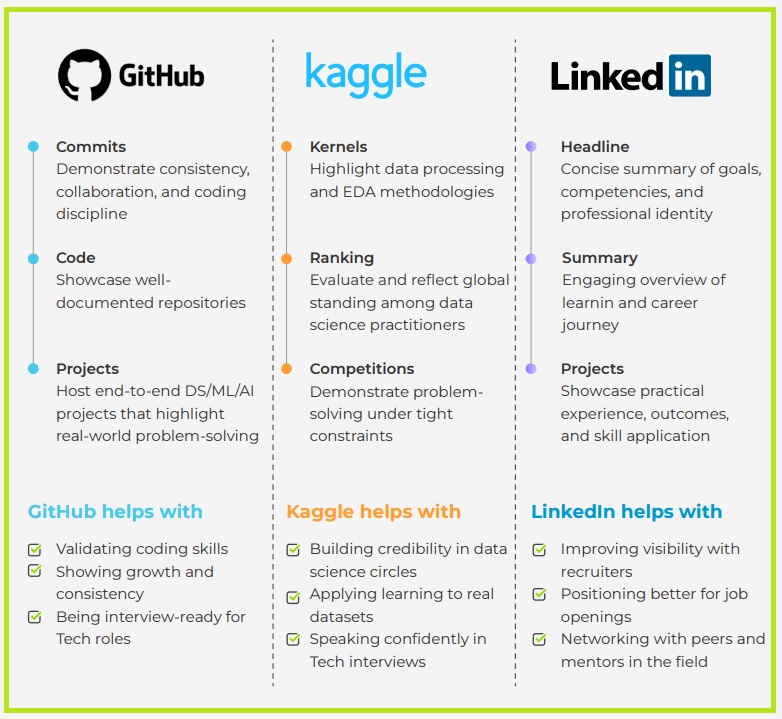
The learning experience in this program feels well-structured and engaging. It’s not a passive, video-only setup like many other online degrees. You get to join live sessions with faculty, attend industry-led workshops, and take part in one-on-one mentorship calls that keep your progress on track.
I also liked how doubt clearing is handled. You don’t have to wait for a weekend session — there are daily doubt-resolution slots and a 24/7 AI-based chat assistant for quick help with platform or scheduling issues. It keeps the flow of learning smooth, especially if you’re studying after work hours.
The career support system is one of upGrad’s strongest parts. You get help with resume writing, LinkedIn optimization, and mock interview sessions that simulate real hiring rounds. Once you complete the program, the team continues to guide you for the next six months, giving access to a curated job portal with open roles relevant to your new skill set.
There’s no direct placement guarantee, and that’s good to be upfront about. But what I noticed is that the structure of support — mentorship, mock interviews, and networking access — actually prepares you for real interviews better than most short-term bootcamps do.
Overall, the learning experience feels guided yet flexible, and the career support stays active even after you finish, which makes a difference when you’re transitioning into AI or ML roles.
Career Outcomes
The results from this program look solid. Many learners from the upGrad Master’s in Machine Learning and AI have moved into roles like Data Scientist, AI Engineer, Machine Learning Engineer, and MLOps Engineer.
As per upGrad’s official reports, about 83% of learners saw a positive career shift after completing the program. The average salary hike is around 50%, which seems realistic for mid-level professionals who apply what they learn.
Alumni now work across IT, BFSI, healthcare, consulting, and e-commerce. This variety shows the degree doesn’t box you into one industry. The skills you learn fit well in multiple domains.
The peer mix is another strong point. You study alongside people from tech, finance, marketing, and even healthcare. During projects, everyone brings their own real-world experience, which makes learning more practical and collaborative.
There’s no placement guarantee, but the support system and the outcomes data show that learners who stay consistent do benefit. The career shifts are genuine — not overnight, but steady and achievable.
Who Should Enroll
This program fits best for working professionals who already have some base in technology, math, or analytics and now want to move into AI-focused roles. If you’ve been doing data analysis or software development and want to step up to machine learning, MLOps, or AI engineering, this course gives you that structure and direction.
It also works well for mid-career professionals who feel stuck doing repetitive analysis and want to move toward model building or applied AI work.
That said, it’s not for complete beginners. If you’ve never coded before or want a short, low-cost course, this might feel too heavy. It takes steady effort for almost two years, and you need to stay consistent to make the most of it.
But if you’re serious about building a career in AI and ready to commit time each week, this program gives you a solid return on that effort.
If this sounds like the right step for you, you can review the current admission details and see if your profile fits. [Check Eligibility →]
Pros and Cons
Every program has its strengths and trade-offs. Here’s what stood out to me after reviewing the upGrad Master’s in Machine Learning and AI in detail.
Pros
1. Comprehensive syllabus
The course doesn’t stop at traditional machine learning. It also includes Deep Learning, MLOps, and Generative AI, giving you a full picture of how AI is used today. Few online master’s programs go this broad while still staying practical.
2. Double alumni status
You earn recognition from both IIIT Bangalore and Liverpool John Moores University (LJMU). That means access to two alumni networks, one in India and one globally — a clear plus if you plan to work or study abroad later.
3. Microsoft certification included
The program now includes a Microsoft certification, which adds extra credibility to your resume. It also gives you exposure to real cloud tools used in AI deployment and data workflows.
4. Strong mix of academia and industry
Courses taught by IIIT Bangalore and LJMU professors give the degree its academic depth, while industry mentors from companies like Hotstar, American Express, and NatWest bring real-world context. That balance helps bridge theory and practical implementation.
5. Specialization flexibility
You can choose between MLOps and Generative AI tracks, or take both if you enroll in the Professional Pack. This is great for professionals who want to explore both development and deployment sides of AI.
6. Research-backed thesis
The final LJMU dissertation adds academic credibility and lets you work on a serious research problem. It’s a strong addition for those considering roles in data science research or even future PhD work.
Cons
1. Not UGC-recognized
Since upGrad acts as a facilitator and not a degree-granting institution, the program itself isn’t UGC-recognized in India. The official degree comes from Liverpool John Moores University (UK), which is valid globally but may not count as a domestic degree in India.
2. No guaranteed placement
upGrad offers career mentorship and a job portal, but there’s no guaranteed placement. You’ll still need to actively apply, network, and use the provided support to get results.
3. Demanding time commitment
The program runs for 18–21 months, which means you’ll need consistent effort every week. It can feel challenging if you’re balancing a full-time job. The pace is steady but requires discipline.
4. Cost vs. shorter options
While the degree offers strong value for what it includes, it’s not a low-cost option. If you’re looking for something short or budget-friendly, you might find the investment high — both in money and time.
Overall, this program is best suited for professionals who see AI as a long-term career move, not a quick certification. The depth of learning, mentorship, and international recognition make it worth it, but only if you’re ready to commit the time and effort it demands.
My Honest Take
After going through every part of this upGrad Master’s in Machine Learning and AI Review, it’s clear why this program continues to stand out. It strikes a rare balance between academic rigor and practical industry relevance. You don’t just study machine learning — you learn how to apply it in real projects, understand how AI systems work end to end, and gain skills that actually hold up in the market.
What impressed me most during this upGrad Master’s in Machine Learning and AI Review is how the program has evolved. The addition of Generative AI, the MLOps track, and the Microsoft certification together make it one of the most future-ready online master’s programs available today.
This degree is ideal for working professionals who want to grow into AI-driven roles without stepping away from their jobs. It offers global recognition, credible mentorship, and the kind of structured learning that builds lasting confidence.
To sum it up, if you’re serious about building a long-term career in machine learning or AI, this upGrad Master’s in Machine Learning and AI Review proves that the program delivers both capability and credibility, in a way few others do.
I’ve shared everything I found during this upGrad Master’s in Machine Learning and AI Review. If you’d like to see the latest cohort dates or explore the application process, visit the official program page below. [Go to Official Program Page →]
FAQ
Now, it’s time to wrap up upGrad Master’s in Machine Learning and AI Review–
Conclusion
The upGrad Master’s in Machine Learning and AI is built for professionals who take their growth seriously. It’s not a quick course. It’s a guided journey that combines academic depth with practical, career-focused learning.
What makes it stand out is the balance — strong university backing, hands-on projects, and relevant topics like Generative AI and MLOps, which define where the field is heading in 2026 and beyond.
If you’re ready to invest steady time and effort, this program gives you both the knowledge to stay ahead and the recognition to stand out. For anyone aiming to move deeper into AI or data science, it’s one of the few online master’s programs that truly feels worth the commitment.
Happy Learning!
You May Also Be Interested In
Best Resources to Learn Computer Vision (YouTube, Tutorials, Courses, Books, etc.)- 2026
Best Certification Courses for Artificial Intelligence- Beginner to Advanced
Best Natural Language Processing Courses Online to Become an Expert
Best Artificial Intelligence Courses for Healthcare You Should Know in 2026
What is Natural Language Processing? A Complete and Easy Guide
Best Books for Natural Language Processing You Should Read
Augmented Reality Vs Virtual Reality: Differences You Need To Know!
What are Artificial Intelligence Examples? Real-World Examples
Thank YOU!
Explore more about Artificial Intelligence.
Thought of the Day…
‘ It’s what you learn after you know it all that counts.’
– John Wooden
Written By Aqsa Zafar
Aqsa Zafar is a Ph.D. scholar in Machine Learning at Dayananda Sagar University, specializing in Natural Language Processing and Deep Learning. She has published research in AI applications for mental health and actively shares insights on data science, machine learning, and generative AI through MLTUT. With a strong background in computer science (B.Tech and M.Tech), Aqsa combines academic expertise with practical experience to help learners and professionals understand and apply AI in real-world scenarios.

